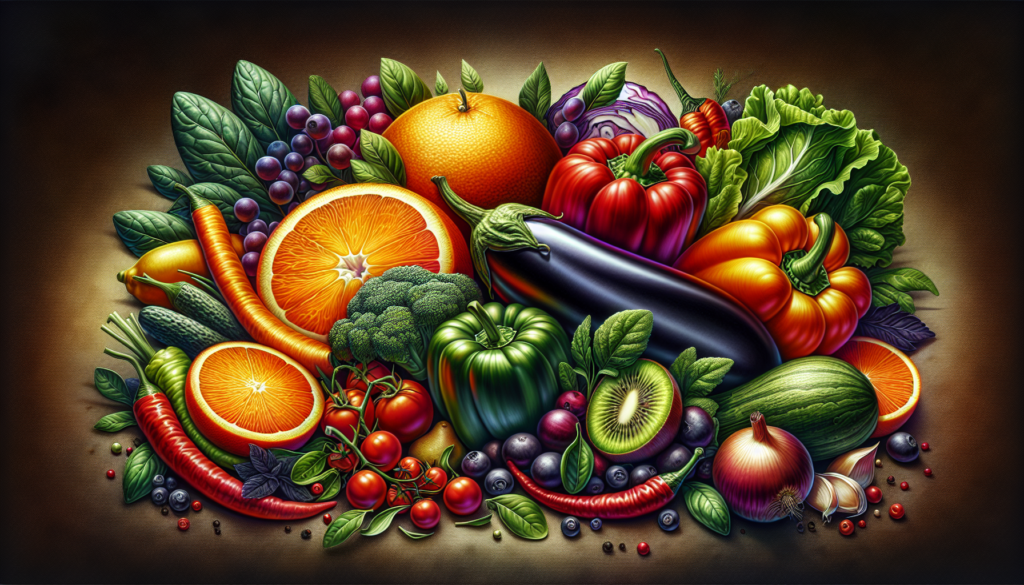Understanding Vitamins and Minerals in Your Diet
Do you ever wonder why your mother always insisted you eat spinach, besides obviously being a follower of Popeye’s school of nutrition? Ever find yourself staring at a bottle of multivitamins, scratching your head and wondering if swallowing them makes you some kind of human composter? Well, look no further! This article is here to unravel the enigma of vitamins and minerals for you, just in time for you to feel superior the next time someone starts talking about their love affair with kale.

What Are Vitamins and Minerals, Anyway?
Let’s start at the very beginning—a very good place to start. Vitamins and minerals are like the unsung heroes of our dietary intake. Despite their minuscule size, they provide a multitude of health benefits worthy of superhero status. Think of them as Batman and Robin, but instead of saving Gotham, they’re saving your body from nutritional oblivion.
Vitamins are organic compounds you need in small amounts to sustain life and health. Minerals, on the other hand, are inorganic elements critical for your body’s daily functions, from building bones to transmitting nerve impulses. While vitamins are like your charming best friend who’s there when you’re in a bind, minerals are the no-nonsense scientist type, keeping everything running like a well-oiled machine. Together, they make quite the dynamic duo. But unlike the movies, in real life, you can’t just pick a favorite and expect everything to work out for the best. You need the whole team.
A Closer Look at Vitamins
What’s in a Name?
Vitamins come alphabetically from A to E (you’d think they’d have gone all the way to Z, but even vitamins can be lazy). Each letter comes with its own set of responsibilities.
- Vitamin A: Famously known as the “see at night” vitamin. It doesn’t give you night vision, but it does keep your eyesight healthy, your skin beautiful, and acts like a gossip columnist by tattling on toxins in your body, helping your immune system stay in top form.
- Vitamin B Complex: Imagine the cast of Friends, but with fewer jokes and more scientific-sounding names like thiamine, riboflavin, niacin, and so on. Each member of the B family has its specialties, from converting food into energy to maintaining your red blood cells.
- Vitamin C: Also known as ascorbic acid. It’s the ‘whatever you can do, I can do better’ of vitamins—powering your immune system, aiding in repairing tissues, and fortifying your bones.
- Vitamin D: Known for being the sunshine vitamin, because it’s produced by your skin in response to—and no surprise here—sunlight. Perfect for keeping those bones and teeth strong, though not so great if you never leave your dungeon.
- Vitamin E: Antioxidant extraordinaire. It protects cells from damage, making it the literal knight in shining armor for your body.
- Vitamin K: Known for helping your blood clot, Vitamin K is the first responder for paper cuts and shaving disasters.
How Much Do You Really Need?
With vitamins, it’s all about quality, not quantity. Too little, and your body will start acting out like a toddler denied ice cream. Too much, and you might start glowing in the dark. Moderation, as always, is the key.
Here’s a quick look at daily recommended amounts:
| Vitamin | Recommended Daily Intake (Adults) |
|---|---|
| Vitamin A | Men: 900 mcg, Women: 700 mcg |
| Vitamin B | B1: 1.2 mg, B2: 1.3 mg, B3: 16 mg, and so forth |
| Vitamin C | 90 mg for men, 75 mg for women |
| Vitamin D | 600 IU |
| Vitamin E | 15 mg |
| Vitamin K | 120 mcg for men, 90 mcg for women |
And remember, these are guidelines, not laws set in stone. It’s always best to consult a health professional if you’re unsure. They’re like the nutrition police, minus the donuts.
Let’s Get Down to Minerals
Major vs. Trace Minerals
Yes, even minerals have a hierarchy, but don’t worry—it’s nothing like high school.
- Major Minerals: These include the likes of calcium, potassium, and sodium. Your body needs higher amounts of these guys, sort of like how you need to hydrate more than you need to sip your grandma’s homemade moonshine.
- Trace Minerals: Zinc, iron, copper, and other cool-sounding names. These you require in minute amounts, proving the adage that good things come in small packages.
Why Are They so Important?
Think of minerals as the stage crew of the theater that is your body. They’re not in the spotlight, but without them, the whole production would come crashing down.
- Calcium: The ultimate bone buddy. It’s like the bricks in the wall of the great house that is your skeleton.
- Iron: Your blood’s best friend. Without it, oxygen transport gets about as sluggish as a teenager on a Sunday morning.
- Zinc: Hard at work behind the scenes, boosting your immune system and possibly making your hair look fabulous in the process.
- Sodium: Regulates blood pressure and balances fluid, but can also be your heart’s worst nightmare if consumed in massive amounts.
- Magnesium: Works on over 300 reactive processes in your body. A true multitasker that could make even the most adept juggler jealous.
Here’s a table to help you wrap your head around just how little or how much you should be taking:
| Mineral | Recommended Daily Intake (Adults) |
|---|---|
| Calcium | 1,000 mg |
| Iron | 8 mg for men, 18 mg for women |
| Zinc | 11 mg for men, 8 mg for women |
| Sodium | Under 2,300 mg |
| Magnesium | 400-420 mg for men, 310-320 mg for women |
Relationship Goals: Vitamins and Minerals Together
Eating a balanced diet is like being in a good relationship. Sure, you could skip a few essential ingredients, but eventually, you’ll end up with a sour-tasting mess. Vitamins and minerals work collaboratively, like a perfectly coordinated dance duo that never steps on each other’s toes.
Take this tango for instance:
-
Vitamin D and Calcium: For all the vitamin D in the world, it doesn’t do much good without calcium. It’s like trying to see fireworks in broad daylight.
-
Vitamin C and Iron: When consumed together, vitamin C can enhance the absorption of iron. They’re the PB&J of the nutrient world, living together in harmony for your health’s benefit.
Multivitamins: Do You Really Need Them?
Ah, the multivitamin conundrum. Remember those Flintstones vitamins you took as a kid? Most adults stand in the vitamin aisle with the same uncertainty, sans Fred and Barney by their side.
Multivitamins cover a wide range of bases and can be a good insurance policy for health, but they’re not a substitute for a healthy diet. Think of them as the Swiss Army knife of nutrition—great in a pinch, but wouldn’t you rather have an entire kitchen at your disposal?

Navigating the Label Madness
So you’re standing in the vitamin aisle, trying not to be overwhelmed by more letters and numbers than a particularly aggressive episode of Sesame Street. How do you choose?
The Dos and Don’ts of Vitamin Shopping:
- Do: Look for a seal of approval from third-party organizations that verify supplements, like NSF or USP. They’re like the health food industry’s secret shoppers.
- Don’t: Fall for false claims—vitamins that promise you the strength of the Hulk or the eternal youth of an elf. Moderation and realism are key.
Finding Your Nutritional Balance
Know Before You Go
Before you start supplementing like a mad scientist experimenting on themselves, take a moment to assess your diet. What vitamins might be missing from your meals? Are there weeks when your only source of vegetables is the lettuce on the burger you scarf down on your way to work?
Eat the Rainbow (No, Not Just Skittles)
We’ve talked about vitamins and minerals, but here’s a secret: Nature has a way of providing for us. A diverse plate filled with colorful produce usually means a richer variety of nutrients.
The rule says if it has a color, it’s good for you. (And yes, carrot cake unfortunately doesn’t count, no matter how much you wish it did.)
In Conclusion
Who knew those tiny nutrients could wield such power? So next time you’re at a party and someone asks if you want to discuss the health benefits of niacin, you’ll be ready. Whether it’s through fresh food, multivitamins, or carefully crafted dietary choices, maintaining adequate levels of vitamins and minerals is crucial. They are your body’s buzzwords, the latest celeb-du-jour, and quite possibly, your wellness wingmen.
Nutrients are best when used wisely, like an ancient magic that needs careful tending—lest you end up with multicolored tongues and a suspected dietary disorder. So munch on those veggies, bask in some sunshine, and remember: the perfect body doesn’t come from a pill, it comes from balanced choices. Make them wisely, make them often, and above all—don’t forget to laugh, it’s the best vitamin after all!
